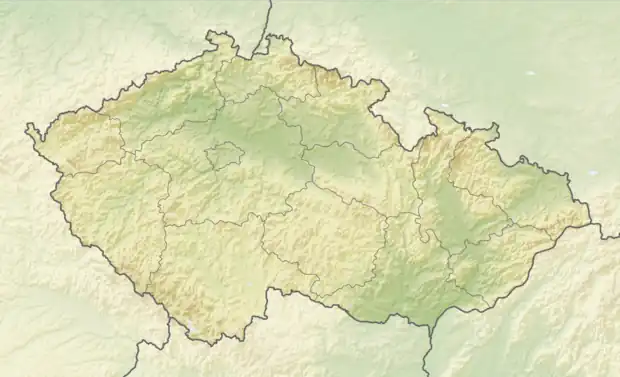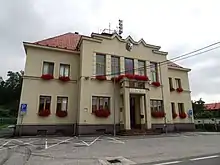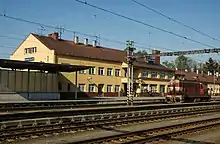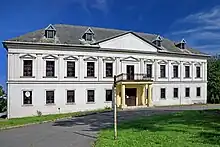Petrovice u Karviné
Piotrowice koło Karwiny | |
|---|---|
 Church of Saint Martin | |
 Flag  Coat of arms | |
 Petrovice u Karviné Location in the Czech Republic | |
| Coordinates: 49°53′46″N 18°32′38″E / 49.89611°N 18.54389°E | |
| Country | |
| Region | Moravian-Silesian |
| District | Karviná |
| First mentioned | 1335 |
| Government | |
| • Mayor | Marian Lebiedzik |
| Area | |
| • Total | 20.47 km2 (7.90 sq mi) |
| Elevation | 212 m (696 ft) |
| Population (2023-01-01)[1] | |
| • Total | 4,924 |
| • Density | 240/km2 (620/sq mi) |
| Time zone | UTC+1 (CET) |
| • Summer (DST) | UTC+2 (CEST) |
| Postal code | 735 72 |
| Website | www |
ⓘ (1920–1952 Petrovice; Polish: ⓘ, German: Petrowitz bei Freistadt) is a municipality and village in Karviná District in the Moravian-Silesian Region of the Czech Republic. It has about 4,900 inhabitants.
Administrative parts

Villages of Dolní Marklovice, Prstná and Závada are administrative parts of Petrovice u Karviné.
Etymology
The name is patronymic in origin, derived from the personal name Petr/Piotr, meaning "Petr's village".[2] Petrovice was renamed Petrovice u Karviné after the extension of the municipality in 1952.[3]
Geography
Petrovice u Karviné is located about 3 kilometres (2 mi) north of Karviná and 17 km (11 mi) northeast of Ostrava, on the border with Poland. It lies in the Ostrava Basin in the historical region of Cieszyn Silesia. The Petrůvka River flows through the municipality and forms a part of the Czech-Polish border. It enters the Olza in Závada. The Szotkówka Stream springs in Prstná. There are several ponds in the municipality.
History
The first written mention of Petrovice is from 1335, when it was mentioned as a seat of a Catholic parish in an incomplete register of Peter's Pence payment as villa Petri. The oldest part of the municipality is Dolní Marklovice, which was first mentioned in Liber fundationis episcopatus Vratislaviensis from around 1305. Politically, the area belonged initially to the Duchy of Cieszyn, established during the fragmentation of Poland into smaller duchies.[4][5] Petrovice was again mentioned in the register of Peter's Pence payment from 1447 among the 50 parishes of Cieszyn deanery as Petirsdorff.[6] It remained ruled by the Piast dynasty until 1653.
After the 1540s Protestant Reformation prevailed in the Duchy of Cieszyn and a local Catholic church was taken over by Lutherans. It was taken from them (as one from around fifty buildings in the region) by a special commission and given back to the Roman Catholic Church on 14 April 1654.[7]
After the Revolutions of 1848 in the Austrian Empire, a modern municipal division was introduced in the re-established Austrian Silesia. The village as a municipality was subscribed at least since 1880 to political district and legal district of Freistadt.
According to the censuses conducted in 1880–1910 the population of the municipality grew from 1,022 in 1880 to 1,444 in 1910. In terms of the language the majority were Polish-speakers (at least 82.8% in 1880, at most 91.3% in 1900), accompanied by German-speakers (at least 6.7% in 1900, at most 15% in 1880) and Czech-speakers (at most 2.6% in 1910). In terms of religion, in 1910 the majority were Roman Catholics (1,410 or 97.6%), followed by Protestants (20 or 1.4%) and Jews (14 or 1%).[8]
After World War I, the Polish–Czechoslovak War and the division of Cieszyn Silesia in 1920, the municipality became a part of Czechoslovakia. Following the Munich Agreement, in October 1938 together with the Trans-Olza region it was invaded by Polish army and annexed by Poland, administratively organised in Frysztat County of Silesian Voivodeship.[9] The municipality was then annexed by Nazi Germany at the beginning of World War II. In 1942–1945, the Germans operated a Polenlager forced labour camp for Poles in the village.[10] After the war it was restored to Czechoslovakia.
In 1952, the municipalities of Dolní Marklovice, Prstná and Závada were merged with Petrovice.[3]
Demographics
Petrovice u Karviné is one of the most populated municipalities without the town status in the Czech Republic. Polish minority made up 12.8% of the population in 2011,[11] but it dropped to 6.8% in 2021.[12] Around 23.4% of the population is religious (mostly Roman-Catholic), which is about the double of the national average.[13]
|
|
| ||||||||||||||||||||||||||||||||||||||||||||||||||||||
| Source: Censuses[14][15] | ||||||||||||||||||||||||||||||||||||||||||||||||||||||||
Transport

Petrovice u Karviné is a railway junction and the site of an important railway border crossing to Zebrzydowice in Poland. There are also three road border crossings and two pedestrian border crossings.
Sport
Sights

The parish Church of Saint Martin dates from 1789. It replaced an old wooden church.[17]
The wooden Church of the Assumption of the Lord in Dolní Marklovice is a timbered church from 1739 with a conical gable tower. It is part of an exceptional group of Silesian wooden churches. In the interior there is a unique decorative painting from the mid-18th century.[18]
Petrovice Castle is an Empire château, built after 1796. It was built in the middle on an English park. Today it is a hotel.[19]
Twin towns – sister cities
Petrovice u Karviné is twinned with:[20]
 Godów, Poland
Godów, Poland Zebrzydowice, Poland
Zebrzydowice, Poland
References
- ↑ "Population of Municipalities – 1 January 2023". Czech Statistical Office. 2023-05-23.
- ↑ Mrózek, Robert (1984). Nazwy miejscowe dawnego Śląska Cieszyńskiego [Local names of former Cieszyn Silesia] (in Polish). Katowice: University of Silesia in Katowice. pp. 138, 246. ISSN 0208-6336.
- 1 2 "O obci" (in Czech). Obec Petrovice u Karviné. Retrieved 2022-02-24.
- ↑ Panic, Idzi (2015). Śląsk Cieszyński w średniowieczu (do 1528) [Cieszyn Silesia in Middle Ages (until 1528)] (PDF) (in Polish). Cieszyn: Starostwo Powiatowe w Cieszynie. pp. 303, 312, 333. ISBN 978-83-935147-8-6.
- ↑ Ptaśnik, Jan (1913). Monumenta Poloniae Vaticana T.1 Acta Camerae Apostolicae. Vol. 1, 1207-1344. Cracoviae: Sumpt. Academiae Litterarum Cracoviensis. p. 366.
- ↑ "Registrum denarii sancti Petri in archidiaconatu Opoliensi sub anno domini MCCCCXLVII per dominum Nicolaum Wolff decretorum doctorem, archidiaconum Opoliensem, ex commissione reverendi in Christo patris ac domini Conradi episcopi Wratislaviensis, sedis apostolice collectoris, collecti". Zeitschrift des Vereins für Geschichte und Alterthum Schlesiens (in German). Breslau: H. Markgraf. 27: 361–372. 1893. Retrieved 21 July 2014.
- ↑ Broda, Jan (1992). "Materiały do dziejów Kościoła ewangelickiego w Księstwie Cieszyńskim i Państwie Pszczyńskim w XVI i XVII wieku". Z historii Kościoła ewangelickiego na Śląsku Cieszyńskim (in Polish). Katowice: Dom Wydawniczy i Księgarski „Didache“. pp. 259–260. ISBN 83-85572-00-7.
- ↑ Piątkowski, Kazimierz (1918). Stosunki narodowościowe w Księstwie Cieszyńskiem (in Polish). Cieszyn: Macierz Szkolna Księstwa Cieszyńskiego. pp. 274, 291.
- ↑ "Ustawa z dnia 27 października 1938 r. o podziale administracyjnym i tymczasowej organizacji administracji na obszarze Ziem Odzyskanych Śląska Cieszyńskiego". Dziennik Ustaw Śląskich (in Polish). Katowice. nr 18/1938, poz. 35. 31 October 1938. Retrieved 1 July 2014.
- ↑ "Polenlager Nr. 93 Petersdorf". Bundesarchiv.de (in German). Retrieved 2 December 2023.
- ↑ "Census 2011". Public database. Czech Statistical Office. Retrieved 2020-11-25.
- ↑ "Population Census 2021: Population by selected ethnicity". Public database. Czech Statistical Office. 2021-03-27.
- ↑ "Population Census 2021: Population by religious belief". Public database. Czech Statistical Office. 2021-03-27.
- ↑ "Historický lexikon obcí České republiky 1869–2011 – Okres Karviná" (in Czech). Czech Statistical Office. 2015-12-21. pp. 3–4.
- ↑ "Population Census 2021: Population by sex". Public Database. Czech Statistical Office. 2021-03-27.
- ↑ "AMK Petrovice" (in Czech). AMK Motokros Petrovice u Karviné. Retrieved 2022-02-24.
- ↑ "Farní kostel sv. Martina" (in Czech). Farnost Petrovice u Karviné. Retrieved 2022-02-24.
- ↑ "Kostel Nanebevstoupení Páně" (in Czech). National Heritage Institute. Retrieved 2022-02-24.
- ↑ "Hotel Zámeček Petrovice u Karviné" (in Czech). CzechTourism. Retrieved 2022-02-24.
- ↑ "Družební obce" (in Czech). Obec Petrovice u Karviné. Retrieved 2022-02-24.
External links
- Official website
- News TV info portal (in Czech)

